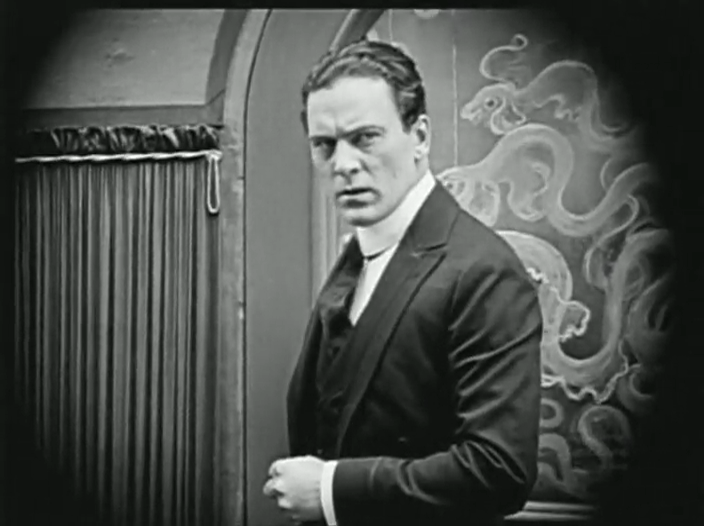This was Mary Pickford’s last silent film and was produced at the technical high point of the form with Sam Taylor directing and Charles Rosher’s camera generating those smooth “european trick shots” Hollywood had come to love. Like all films of the late period, they feel more modern than they should do given our exposure to the dulled ice age of early talkies which left events stuck in studio, actors huddled around immobile microphones… But here, the camera swoops, travels on speeding motorcars and, most importantly, shows us two people falling in love.
Whether or not the two stars began their relationship with this film is open to debate and it would be a full ten years before they tied the knot to begin their 42-year marriage, but it feels like it.
 |
| The future Mrs and Mr Pickford... |
Regardless of the events off-set, the film stands as one of Pickford’s best and most enduring: a thousand rom-coms have followed in its footsteps including those still featuring Zooey and Amy.
 |
| Pots and pans |
Maggie works in Merril’s Department Store – I have a penchant for films set in 1920s department stores: think of Clara Bow in It! or Brent and Brooks in Love ‘em and Leave ‘em… places where society mixes almost on a level and where there’s always the possibility of unexpected dalliances across the class divide.
 |
| Are you being served? |
The two get on well and soon share their lunchtimes sitting cosy in a packing crate in the staff room. It is here where we see Mary’s first prolonged screen kiss: a side-on affair that conveys much delicate passion.
Maggie invites Joe home, where he gets to meet the family: Pa Johnson (Lucien Littlefield) a man disorientated by the curious position in which life has left him, not least of which is his easily-shocked and narcoleptic wife (Sunshine Hart) whom he frequently has to rouse with smelling salts.
Then there’s sister Liz (Carmelita Geraghty) a jazz baby hanging around with decidedly-dodgy men and, as a result, in constant conflict with her parents.
 |
| Sunshine Hart, Carmelita Geraghty, Mary, Pat Harmon and Lucien Littlefield |
But she’s not the only one hiding something… “Joe” is actually Joseph, the son and heir to the Merrill fortune who has been assigned to the shop by his father Robert (Hobart Bosworth) in order to learn the business without his name giving him advantage.
His mother Esther (Evelyn Hall) also has ambitions and wants to see him married off to the winsome and wealthy Millicent Rogers (Avonne Taylor). Joe doesn’t appear to have any strong feelings about this social arrangement, at least not yet at any rate.
 |
| Buddy Rogers |
Joe and Maggie go on a rain-sodden date as he ignores his parent’s request to dine with them – they are planning to announce his engagement. He persuades Maggie to venture to the Merrill’s house to see if the family’s oft-pronounced equal treatment would extend to their being offered dinner.
Winking his way past the doorman and butlers he gets them to lay on a meal whilst Maggie looks around in nervous amazement: even more delighted by her dazzling young man than before. But, they are rudely interrupted by Joe’s parents as they arrive back home with the decorative Millicent in tow… the game’s up!
Meanwhile, Liz’ fella has really dropped her in it and they are being processed before the night court. Unable to contact the brains of the family, the Johnson’s are helpless to prevent their younger daughter from being locked up.
As luck would have it, Maggie, having tearfully made her excuses and left, encounters Ma and Pa downtown as they enter the court: she goes into battle for her sister in front of a Judge played by Mack Swain.
But Joe isn’t done yet and goes out in search of his “best girl” – he’s not going to be swayed. A helpful hobo spots events and directs him to the court where he is in time to see Maggie’s eloquent defence and to end up in clink after thumping Liz’s no good boyfriend.
 |
| Maggie brings order to the court |
My Best Girl is a lovely film and one to file under heart-warming. Rogers is good in the same way he was in Wings: wholehearted and sincere… my teenage daughter recognised those regular features instantly!
But he’s not the one you watch. It’s Mary’s show and she demonstrates an undimmed intensity with a face and a voice that can almost be heard… so close is she to the talkies. She performs particularly well in the ending section I’m not mentioning and there was hardly a dry eye in our living room: how can she do that when we can almost see it coming!? Amazing skill: a wizard and a true star!
 |
| The look of love... |
My Best Girl is available direct for institutional use from Milestone or from Amazon’s second hand sellers – seems it’s out of print and becoming collectable. Hopefully the good folks at Milestone have a Blu-ray in the works, this is indeed amongst the very best of Pickford.
Trivia: Carole Lombard has an uncredited appearance as a Flirty Salesgirl whilst Charles Rosher deservedly received an Academy Award nomination for his cinematography. He shot so many of Pickford’s films not to mention his other projects with Herr Murnau.
.jpg) |
| Carole Lombard and Buddy |


.jpg)
.jpg)
+bath.jpg)
+duel.png)
+1.jpg)
+3.jpg)
+duel.jpg)
+duel+snow+2.jpg)
.jpg)
+2.jpg)
.jpg)
.jpg)
.jpg)
+older.jpg)
.jpg)
+greenhouse.jpg)
.jpg)


















+smiling+still.jpg)

















%20Despair.png)








